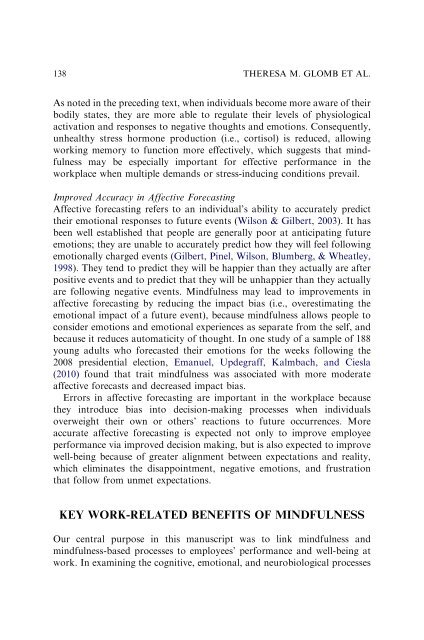Mindfulness at work (Glomb, Duffy et al, 2012) - Human Resources
Mindfulness at work (Glomb, Duffy et al, 2012) - Human Resources
Mindfulness at work (Glomb, Duffy et al, 2012) - Human Resources
You also want an ePaper? Increase the reach of your titles
YUMPU automatically turns print PDFs into web optimized ePapers that Google loves.
138THERESA M. GLOMB ET AL.As noted in the preceding text, when individu<strong>al</strong>s become more aware of theirbodily st<strong>at</strong>es, they are more able to regul<strong>at</strong>e their levels of physiologic<strong>al</strong>activ<strong>at</strong>ion and responses to neg<strong>at</strong>ive thoughts and emotions. Consequently,unhe<strong>al</strong>thy stress hormone production (i.e., cortisol) is reduced, <strong>al</strong>lowing<strong>work</strong>ing memory to function more effectively, which suggests th<strong>at</strong> mindfulnessmay be especi<strong>al</strong>ly important for effective performance in the<strong>work</strong>place when multiple demands or stress-inducing conditions prevail.Improved Accuracy in Affective ForecastingAffective forecasting refers to an individu<strong>al</strong>’s ability to accur<strong>at</strong>ely predicttheir emotion<strong>al</strong> responses to future events (Wilson & Gilbert, 2003). It hasbeen well established th<strong>at</strong> people are gener<strong>al</strong>ly poor <strong>at</strong> anticip<strong>at</strong>ing futureemotions; they are unable to accur<strong>at</strong>ely predict how they will feel followingemotion<strong>al</strong>ly charged events (Gilbert, Pinel, Wilson, Blumberg, & Whe<strong>at</strong>ley,1998). They tend to predict they will be happier than they actu<strong>al</strong>ly are afterpositive events and to predict th<strong>at</strong> they will be unhappier than they actu<strong>al</strong>lyare following neg<strong>at</strong>ive events. <strong>Mindfulness</strong> may lead to improvements inaffective forecasting by reducing the impact bias (i.e., overestim<strong>at</strong>ing theemotion<strong>al</strong> impact of a future event), because mindfulness <strong>al</strong>lows people toconsider emotions and emotion<strong>al</strong> experiences as separ<strong>at</strong>e from the self, andbecause it reduces autom<strong>at</strong>icity of thought. In one study of a sample of 188young adults who forecasted their emotions for the weeks following the2008 presidenti<strong>al</strong> election, Emanuel, Updegraff, K<strong>al</strong>mbach, and Ciesla(2010) found th<strong>at</strong> trait mindfulness was associ<strong>at</strong>ed with more moder<strong>at</strong>eaffective forecasts and decreased impact bias.Errors in affective forecasting are important in the <strong>work</strong>place becaus<strong>et</strong>hey introduce bias into decision-making processes when individu<strong>al</strong>soverweight their own or others’ reactions to future occurrences. Moreaccur<strong>at</strong>e affective forecasting is expected not only to improve employeeperformance via improved decision making, but is <strong>al</strong>so expected to improvewell-being because of gre<strong>at</strong>er <strong>al</strong>ignment b<strong>et</strong>ween expect<strong>at</strong>ions and re<strong>al</strong>ity,which elimin<strong>at</strong>es the disappointment, neg<strong>at</strong>ive emotions, and frustr<strong>at</strong>ionth<strong>at</strong> follow from unm<strong>et</strong> expect<strong>at</strong>ions.KEY WORK-RELATED BENEFITS OF MINDFULNESSOur centr<strong>al</strong> purpose in this manuscript was to link mindfulness andmindfulness-based processes to employees’ performance and well-being <strong>at</strong><strong>work</strong>. In examining the cognitive, emotion<strong>al</strong>, and neurobiologic<strong>al</strong> processes


